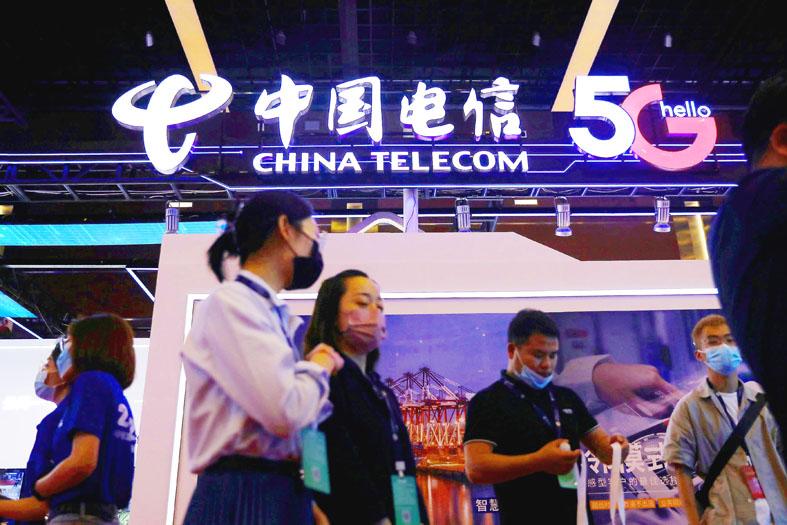China Telecom Corp (中國電信), one of the three Chinese telecom carriers booted off the New York Stock Exchange, is planning to raise 47.1 billion yuan (US$7.3 billion) from a listing in Shanghai that is set to be the world’s biggest so far this year.
The A-shares were priced at 4.53 yuan apiece, above the company’s book value of 4.49 yuan each. The fundraising by China’s largest fixed-line operator is the biggest stock sale this year globally, exceeding the US$6.3 billion initial public offering in Hong Kong by TikTok rival Kuaishou Technology (快手) in February.
China Telecom was one of three of China’s big state-owned carriers whose American depositary receipts were delisted by the New York Stock Exchange in May, following an executive order issued by former US president Donald Trump barring US investments in companies with ties to the Chinese military.

Photo: Reuters
The pivot to raise funds on home turf comes as Beijing extends a crackdown on local companies that are listing abroad and as tensions between the US and China continue to ratchet up.
However, China Telecom, which went public in Hong Kong and New York in 2002, has had to scale back its fund raising in Shanghai. The sale of 10.4 billion A shares in the offering, excluding a greenshoe option, is down from the 12.1 billion it had said it would initially sell in April.
Still, if the Chinese firm exercises an over-allotment option, it could raise as much as 54.2 billion yuan from the sale, it said in a statement to the exchange.
China Telecom’s listing would help it diversify financing channels, analysts said. The telecom titan needs to ramp up funding as it backs China’s ambitions to lead in building investment-heavy super-fast 5G networks.
The company is expected to continue benefiting as growth in China’s mobile subscription base recovers along with a digital transformation drive, Jefferies analysts Edison Lee, Lydia Lin and Chi Tsai wrote in a note.
After the A-share listing, “we estimate CT will turn from a net debt position of 30 billion yuan last year to a net cash position of 21.5 billion yuan,” they wrote.
Proceeds from the Shanghai IPO would be used to build a high bandwidth industrial 5G platform, cloud-network integration, a new information infrastructure project, and research and development, China’s Telecom said in a filing to the Shanghai Stock Exchange. Chinese brokerages China International Capital Corp (中國國際金融) and CITIC Securities Co (中信證券) are joint sponsors for the listing.

Taiwan Semiconductor Manufacturing Co (TSMC, 台積電) secured a record 70.2 percent share of the global foundry business in the second quarter, up from 67.6 percent the previous quarter, and continued widening its lead over second-placed Samsung Electronics Co, TrendForce Corp (集邦科技) said on Monday. TSMC posted US$30.24 billion in sales in the April-to-June period, up 18.5 percent from the previous quarter, driven by major smartphone customers entering their ramp-up cycle and robust demand for artificial intelligence chips, laptops and PCs, which boosted wafer shipments and average selling prices, TrendForce said in a report. Samsung’s sales also grew in the second quarter, up

LIMITED IMPACT: Investor confidence was likely sustained by its relatively small exposure to the Chinese market, as only less advanced chips are made in Nanjing Taiwan Semiconductor Manufacturing Co (TSMC, 台積電) saw its stock price close steady yesterday in a sign that the loss of the validated end user (VEU) status for its Nanjing, China, fab should have a mild impact on the world’s biggest contract chipmaker financially and technologically. Media reports about the waiver loss sent TSMC down 1.29 percent during the early trading session yesterday, but the stock soon regained strength and ended at NT$1,160, unchanged from Tuesday. Investors’ confidence in TSMC was likely built on its relatively small exposure to the Chinese market, as Chinese customers contributed about 9 percent to TSMC’s revenue last

LOOPHOLES: The move is to end a break that was aiding foreign producers without any similar benefit for US manufacturers, the US Department of Commerce said US President Donald Trump’s administration would make it harder for Samsung Electronics Co and SK Hynix Inc to ship critical equipment to their chipmaking operations in China, dealing a potential blow to the companies’ production in the world’s largest semiconductor market. The US Department of Commerce in a notice published on Friday said that it was revoking waivers for Samsung and SK Hynix to use US technologies in their Chinese operations. The companies had been operating in China under regulations that allow them to import chipmaking equipment without applying for a new license each time. The move would revise what is known

UNCERTAINTY: A final ruling against the president’s tariffs would upend his trade deals and force the government to content with billions of dollars in refunds The legal fight over US President Donald Trump’s global tariffs is deepening after a federal appeals court ruled the levies were issued illegally under an emergency law, extending the chaos in global trade. A 7-4 decision by a panel of judges on Friday was a major setback for Trump, even as it gives both sides something to boast about. The majority upheld a May ruling by the Court of International Trade that the tariffs were illegal. However, the judges left the levies intact while the case proceeds, as Trump had requested, and suggested that any injunction could potentially be narrowed to apply